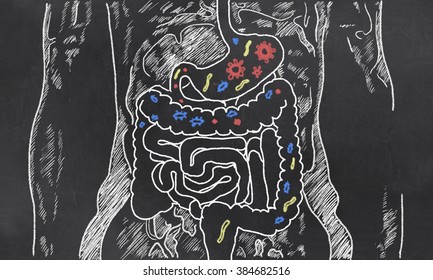It is estimated that the human body has around 100 trillion microbiota cells, with a total of 232 million genes. The microbiota which constitute within our gut, make up about 22 million of these genes – making it the human body’s largest population of microorganisms.
GUT MICROBIOTA
The gut microbiota, is the name given to the microbiota found within our intestines.
Microbiota – A community of micro-organisms (e.g bacterium, virus, fungus).
The gut microbiota – have been studied extensively and are shown to interact with one another, and with the human body’s immune system to influence our health and development of disease.
What does the gut microbiota do?
The gut microbiota ferments non-digestible substrates, like dietary fibre. When we eat fibre, we do not break it down and digest it, and it passes into the large intestine where it is fermented to produce short chain fatty acids (SCFAs) and gases.
Gut Microbiome, Obesity and Non-Communicable Diseases
Obesity and non-communicable diseases (cardiovascular problems, type 2 diabetes etc.) feature alterations in the make up of human gut microbiome. For example:
Obese individuals show higher levels of firmicutes, and lower levels of bateroidetes.
Lower levels of bacterodies are associated with stroke and heart attack, whilst high levels of firmicutes is associated with type 2 diabetes.
Alterations to your gut microbiome has been linked with many conditions including the ones above, plus several other gastrointestinal diseases, including: irritable bowel syndrome (IBS), celiac disease, functional dyspepsia and others.
What can alter your gut microbiome?
A lot of things can alter your gut microbiome including:
- Diet
- Antibiotics
- Age
- Stress
- Feeding styles in during pregnancy and during infancy
How can diet alter my gut microbiome?
The amount and type of dietary macronutrients (carbohydrates, fats & proteins) have a huge impact on the composition of your gut microbiome – affecting the main bacteria, Bacteoidetes (9-42%), Firmicutes (30-52%) and Actinobacteria (1-13%) that constitute the gut microbiome, and other bacteria in the gut microbiota include – lactobacillae, streptocci and entrobacteria
The make up of the micro-organisms within the gut depend on various factors; including type of childbirth & pre and postnatal feeding and diet, as the gut microbe population is transferred from mother to child.
It is reported that diets – low in fibre and higher in fat, have a smaller amount of important microbial species and higher levels of pathogenic bacteria. Compared to a diet lower in fat & high in fibre.
Diets high in protein and low in total carbohydrates and fibre – results in significant decreases in protective microbial species (related to cancer) and increased concentrations of hazardous microbes. Compared with diets higher in carbohydrates *total carbohydrate of this study was (22g per day .. very low!!).
Complex carbohydrates are higher in fibre that simple carbohydrates, and act as an important resource for microbial growth – and are often to referred to as prebiotics, non-digestible components of foods that benefit the host (us) by stimulate the growth of the microbiota.
Prebiotics – inulin, fructoologiosaccharides and oligosaccharides act as important sources that promote the growth of bifidobacteria & lactobacilli.

Prebiotic vs. Probiotic
You may have heard of both prebiotic and probiotics, and asked what is the difference?
Well as we already know: prebiotics, are a form of dietary fibre that feeds the bacteria & promotes their growth in the gut.
Whilst probiotics are the ”good” bacteria found in certain foods & supplements. Probiotics are thought to help to restore a balance of bacteria in our gut, and to help with preventing and treating conditions such as: diarrhea, and irritable bowel syndrome (IBS).
Foods like: yoghurt, kefir, tempeh, miso, sourdough, fermented vegetables & pickles in brine are good sources of probitoics.
Prebiotics or probiotics?
Well both.
They’re both best to be used to support each other & make each more effective to better the composition of your gut, protect against diseases, and support digestion.

